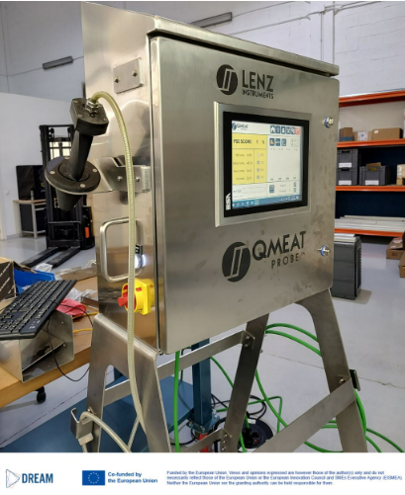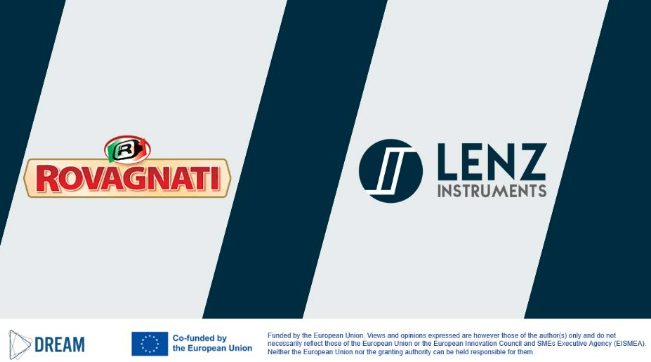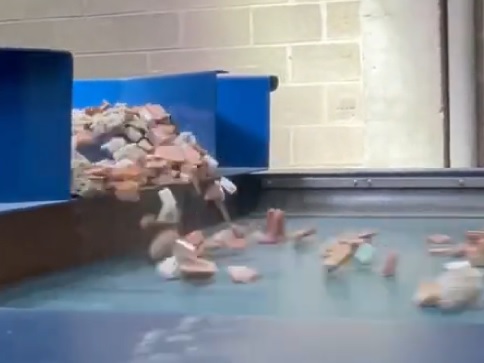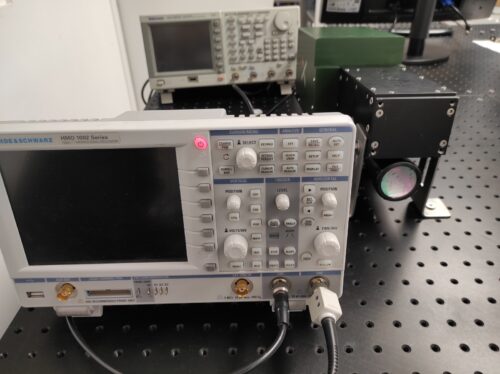
15/01/2025
FOTO-CER, development of transparent photovoltaic devices integrated into ceramic construction elements
The FOTO-CER project aims to develop transparent photovoltaic devices for integration into ceramic materials (tiles), for application on facades, while maintaining their aesthetic qualities.

23/01/2024
DREAM HAM
⚙️ The last week, the new QMEAT PROBE™ that we have improved thanks to the DREAMHAM project left our facilities on its way to Italy.
Its destination 📍Rovagnati S.p.A. a company that produces all types of typical Italian sausages. QMEAT PROBE™ is an inspection system that allows non-destructive analysis of meat quality parameters such as texture and water retention capacity of pork. In particular, the system allows detecting meat with PSE (Pale, Soft & Exudative) defects.
In close relationship with Rovagnati S.p.A., pilot tests will be carried out to validate the improvements implemented, including the adoption of #Artificial Intelligence to improve prediction models.
Thanks DREAM Eurocluster for this opportunity! 👏

04/10/2023
DREAM HAM
We are thrilled to announce that we are among the selected participants in the European project DREAM Eurocluster Open.
As a result, we are embarking on a new collaborative project with the Italian company Rovagnatti with the aim of reducing meat wastage by providing the food industry with a reliable tool for detecting quality defects in raw meat.
We are ready! 🚀

09/05/2023
A Novel Solution for the Inspection of Polyvinyl Butyral (PVB) films in Laminated Glass
In the frame of the collaborative European Project SUNRISE (grant agreement nº958243), LENZ INSTRUMENTS has developed a novel solution for the inspection of Polyvinyl Butyral (PVB) in laminated glass.

05/05/2023
The European ICEBERG project faces its last year of activity with all case studies in progress
Bilbao, May 5, 2023. The ICEBERG Project in which 35 public and private organizations from ten European countries are involved, faces its last working year with important advances in the recycling of construction materials, new scientific publications and patents in progress.
01/03/2023
Platform-ZERO: Cutting-Edge Metrology for the Nanomaterials Industry
The Collaborative European Research Project “PLATFORM-ZERO” has been launched on January 2023.

20/12/2022
IN4CIS – INSPECTION OF 3rd GENERATION PHOTOVOLTAIC DEVICES
Within the framework of the IN4CIS project, Lenz Instruments has developed a system for the inspection of 3rd generation photovoltaic devices up to 30×30 mm in size. The system integrates a multi-sensor head made up of a Raman probe and a photoluminescence probe.

05/04/2022
FOTO-CER PROJECT WILL DEVELOP PHOTOVOLTAIC CERAMIC TILES WHILE KEEPING THEIR AESTHETIC QUALITIES
A new consortium formed by eight companies, in collaboration with four research centres, aims at incorporating photovoltaic properties into buildings’ facades by integrating high-transparency and optical-quality devices into their tiled surface.

15/09/2021
A Pilot Line for Sorting and Recycling Construction and Demolition Waste
We are working on the development of a pilot line for sorting mixed ceramic fractions from construction and demolition waste. The pilot line is designed to process up to 1 ton per hour of input material, and is aimed to sort it into three main streams: grey fraction (concrete), red fraction (brick fragments) and other materials, including gypsum.

09/09/2021
First Advanced Optical Inspection System for Next-generation Thin Film Photovoltaics
We have completed the production of an automated inspection system to automatically analyse thin film photovoltaic modules. The system integrates an optical head, which delivers light onto the module, gathers its optical response, and guides the light into different spectroscopic modules for analysis. By means of advanced data processing techniques, this spectral information can be used to assess the quality and efficiency of thin film materials, during the manufacturing process. The early detection of manufacturing defects is of paramount importance to (1) identify manufacturing errors and implement early actions; (2) maximise production yield; (3) ensure the quality and reliability of the modules; and (4) minimise manufacturing waste.
